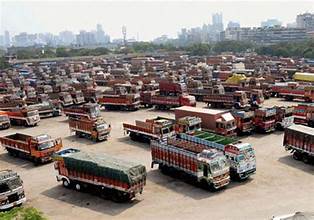Truckers Strike: In various states across the nation, truck drivers have taken to the streets in a widespread protest. This large-scale demonstration is not merely a show of solidarity but also involves acts of arson. The drivers are protesting against the newly implemented ‘hit-and-run’ regulations, which introduce stringent punishments. Several media outlets have mistakenly reported these rules as part of the Motor Vehicle Act. However, the Transport Ministry has clarified that this is a misconception, emphasizing that the regulations are, in fact, a part of a newly passed law by the Parliament, not the Vehicle Act.
The Root of the Protests: New ‘Hit-and-Run’ Regulations
The recent upheaval in the trucking community is primarily in response to the ‘hit-and-run’ provisions of the newly passed Indian Justice Code, replacing the colonial-era Indian Penal Code. These provisions specifically target incidents where a two-wheeler rider is hit and the driver flees the scene without informing authorities. Under the new law, individuals involved in a ‘hit-and-run’ could face penalties up to 7 million rupees and even a jail sentence of up to 10 years.
Misconceptions and Clarifications from the Transport Ministry
On Tuesday, 2nd January, the Transport Ministry addressed some of the misconceptions being circulated in the media. It was highlighted that the ongoing truckers’ strike is being erroneously linked to the Motor Vehicle Act. The Ministry emphasized that the strike is a response to the new laws passed by Parliament, not the Vehicle Act.
Widespread Impact of the Truckers’ Strike
The strike has taken a significant toll across major Indian states including Maharashtra, Gujarat, and Rajasthan. Truck drivers’ protests have led to a disruption in the supply of essential goods, with the most immediate effect being observed at petrol stations. Cities like Mumbai and Thane are experiencing a severe shortage of fuel, evidenced by the long queues forming outside petrol pumps.
The Economic and Social Ramifications
The truckers’ strike is not just a transportation issue but also a significant economic and social concern. The halt in the supply chain of essential commodities like fuel has ripple effects throughout the economy, affecting businesses and daily lives. The urgency of resolving this strike is paramount, not only for the trucking industry but for the nation’s overall economic stability.
Seeking a Resolution: The Way Forward
The government and the truckers’ unions are in a critical phase of negotiation. It is essential for both parties to reach a consensus that addresses the concerns of the truck drivers while ensuring public safety and adherence to the law. The resolution of this conflict will require a balanced approach, respecting the rights of the truckers and the need for stringent traffic laws to ensure road safety.
Disclaimer : इस न्यूज़ पोर्टल को बेहतर बनाने में सहायता करें और किसी खबर या अंश मे कोई गलती हो या सूचना / तथ्य में कोई कमी हो अथवा कोई कॉपीराइट आपत्ति हो तो वह [email protected] पर सूचित करें। साथ ही साथ पूरी जानकारी तथ्य के साथ दें। जिससे आलेख को सही किया जा सके या हटाया जा सके ।














